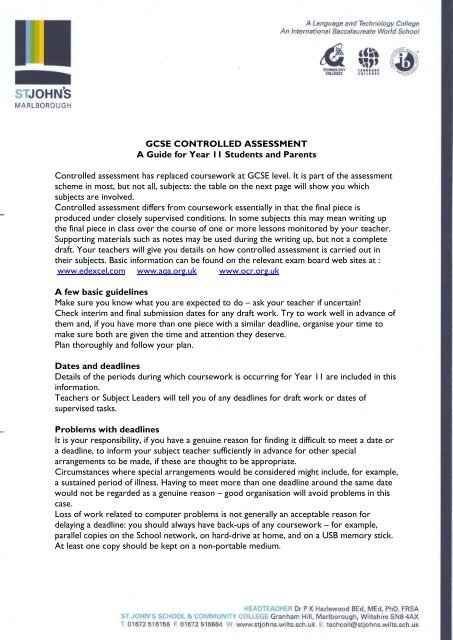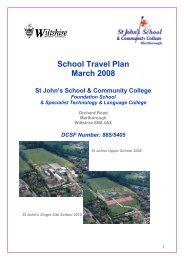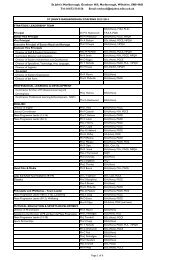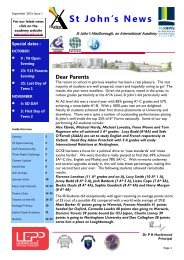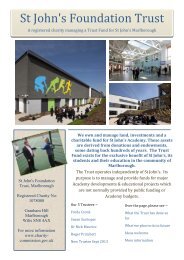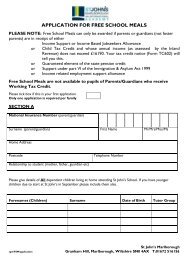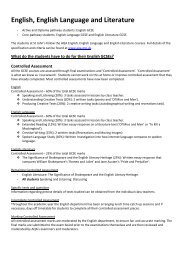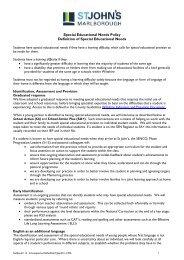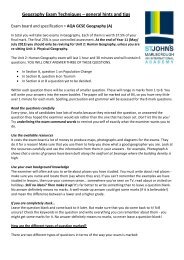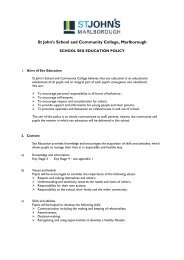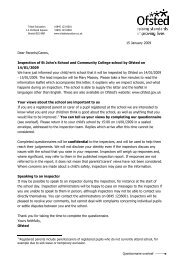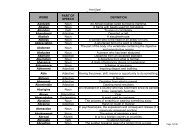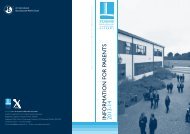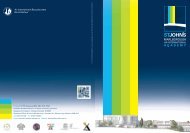GCSE CONTROLLED ASSESSMENT A Guide for Year 11 Students ...
GCSE CONTROLLED ASSESSMENT A Guide for Year 11 Students ...
GCSE CONTROLLED ASSESSMENT A Guide for Year 11 Students ...
- No tags were found...
Create successful ePaper yourself
Turn your PDF publications into a flip-book with our unique Google optimized e-Paper software.
<strong>GCSE</strong> <strong>CONTROLLED</strong> <strong>ASSESSMENT</strong>A <strong>Guide</strong> <strong>for</strong> <strong>Year</strong> <strong>11</strong> <strong>Students</strong> and ParentsControlled assessment has replaced coursework at <strong>GCSE</strong> level. It is part of the assessmentscheme in most, but not all, subjects: the table on the next page will show you whichsubjects are involved.Controlled assessment differs from coursework essentially in that the final piece isproduced under closely supervised conditions. In some subjects this may mean writing upthe final piece in class over the course of one or more lessons monitored by your teacher.Supporting materials such as notes may be used during the writing up, but not a completedraft. Your teachers will give you details on how controlled assessment is carried out intheir subjects. Basic in<strong>for</strong>mation can be found on the relevant exam board web sites at :www.edexcel.com www.aqa.org.uk www.ocr.org.ukA few basic guidelinesMake sure you know what you are expected to do – ask your teacher if uncertain!Check interim and final submission dates <strong>for</strong> any draft work. Try to work well in advance ofthem and, if you have more than one piece with a similar deadline, organise your time tomake sure both are given the time and attention they deserve.Plan thoroughly and follow your plan.Dates and deadlinesDetails of the periods during which coursework is occurring <strong>for</strong> <strong>Year</strong> <strong>11</strong> are included in thisin<strong>for</strong>mation.Teachers or Subject Leaders will tell you of any deadlines <strong>for</strong> draft work or dates ofsupervised tasks.Problems with deadlinesIt is your responsibility, if you have a genuine reason <strong>for</strong> finding it difficult to meet a date ora deadline, to in<strong>for</strong>m your subject teacher sufficiently in advance <strong>for</strong> other specialarrangements to be made, if these are thought to be appropriate.Circumstances where special arrangements would be considered might include, <strong>for</strong> example,a sustained period of illness. Having to meet more than one deadline around the same datewould not be regarded as a genuine reason – good organisation will avoid problems in thiscase.Loss of work related to computer problems is not generally an acceptable reason <strong>for</strong>delaying a deadline: you should always have back-ups of any coursework – <strong>for</strong> example,parallel copies on the School network, on hard-drive at home, and on a USB memory stick.At least one copy should be kept on a non-portable medium.
<strong>ASSESSMENT</strong> GUIDELINESPLEASE READ THROUGH THESE GUIDELINES BEFORE STARTING WORKN.B. SUBJECTS MAY ALSO HAVE SPECIFIC OR ALTERNATIVE GUIDELINESPlanningMake sure that you understand the task;Know how long the project has to be, when it has to be handed in, what <strong>for</strong>mat itmust take, how the marks are to be awarded.List the main aspects of the topic and select the keywords – a ‘spider chart’ may behelpful.Make a plan with an introduction, conclusion and bibliography or list of references.FindingDiscuss your ideas with other people, including your teacher.List all the things that you will need .Make a list of all the sources of in<strong>for</strong>mation that will help you in your task: books, websites, newspapers,magazines, DVD’s and any other materials.SelectingKeep full notes of the sources you use as you go along. This will help you to compile your bibliographyor list of references. Check with your teacher whether you should quote title, date, etc. using theHarvard System.Cut and paste in<strong>for</strong>mation found into a Word document or Excel Spreadsheet instead of printing outsource material. This will save time in the 'writing up' stageAnalysingHaving selected your material and in<strong>for</strong>mation, decide upon the most suitable approach.PresentingMake sure that your name is on every page and that each page is numbered.The title should appear at the top of the first page.Put the material into your own words and provide sufficient explanation <strong>for</strong> an unin<strong>for</strong>medreader.The conclusion should be a brief, clear answer to the task.Check that the layout and <strong>for</strong>mat is suited to the task.Self EvaluatingRealise your strengths by identifying the most successful part of the whole process.When the project has finished, make a note of any teacher’s comments consider how othersapproached the task and how you would undertake a similar project in the future.
COURSEWORK - AVOIDING PLAGIARISMThis guidance should help you understand and avoid plagiarism, which is something you must avoid inexamination coursework it is intended to apply to controlled assessment, but it may also be useful in thecontext of other essays and project pieces set by your teachers. Although references throughout are towritten pieces, similar principles apply to controlled assessment that takes other <strong>for</strong>ms, such as practicalactivity or production ofan artefact.What is plagiarism?Plagiarism is using another person’s words or ideas without giving credit to the other person.You must give credit if you:- directly use someone else’s words from a book, magazine, newspaper, essay, web page, or anyother medium- use in<strong>for</strong>mation or specific phrases gained through interviewing another person- use ideas that someone else has given you in conversation, e-mail or other <strong>for</strong>m ofcommunication- reprint any diagrams, illustrations, charts and picturesYou don’t need to give credit if you:- if you are writing your own observations, insights, thoughts or conclusions about a subject- if you are stating what can be regarded as generally accepted facts or opinions, or sharedin<strong>for</strong>mation within your area of study- if you are writing up your own experimental resultsWhat this means is that, if you use in<strong>for</strong>mation or ideas gained from your own research, from discussionin class or with other people, or from your teacher’s notes, you must present them in your own words.If you directly use someone else’s words, you must acknowledge this in some way.You can acknowledge sources bymentioning them in a footnote or bibliography [list of sources]using quotation marks in your text to enclose directly-quoted sectionsJCQ NOTICE TO CANDIDATESThis follows on the next page. You must make sure you have read and understood it.With thanks to King Edward’s School, Southampton
This notice has been produced on behalf of:AQA, City & Guilds, CCEA, Edexcel, OCR and WJECIn<strong>for</strong>mation <strong>for</strong> candidates<strong>GCSE</strong>, Functional Skills and Principal Learning, Controlled AssessmentsThis document tells you about some things that you must and must not do when you arecompleting your work.Be<strong>for</strong>e you submit any work <strong>for</strong> marking, you will be asked to sign an authenticationstatement confirming that you have read and followed these regulations.If there is anything that you do not understand, you must ask your teacher or lecturer.Controlled Assessment will provide you with an opportunity to do some independent research into atopic. The research you do may involve looking <strong>for</strong> in<strong>for</strong>mation in published sources such as textbooks,encyclopedias, journals, TV, radio, and on the internet.Using in<strong>for</strong>mation from published sources (including the internet) as the basis <strong>for</strong> your assignment is agood way to demonstrate your knowledge and understanding of a subject, but you must take care howyou use this material - you cannot copy it and claim it as your own work.The regulations state that:“the work which you submit <strong>for</strong> assessment must be your own”,“you must not copy from someone else or allow another candidate to copy from you”.If you use the same wording as a published source, you must place quotation marks around thepassage and state where it came from. This is called “referencing”. You must make sure that you givedetailed references <strong>for</strong> everything in your work which is not in your own words. A reference from aprinted book or journal should show the name of the author, the year of publication and the pagenumber, <strong>for</strong> example: (Morrison, 2000, pg.29).For material taken from the internet, your reference should show the date when the material wasdownloaded and must show the precise web page, not the search engine used to locate it. This can becopied from the address line. For example:(http://www.bbc.co.uk/schools/16/sosteacher/history/49766.shtml), downloaded 12 February 2012.You may be required to include a bibliography at the end of your work. Your teacher or lecturer will tellyou whether a bibliography is necessary. Where required, your bibliography must list the full details ofpublications you have used in your research, even where these are not directly referred to, <strong>for</strong>example: Morrison, A. (2000) “Mary, Queen of Scots”, London: Weston Press.If you copy the words or ideas of others and don’t show your sources in referencesand a bibliography, this will be considered as cheating.1
Preparing your work – good practiceIf you receive help and guidance from someone other than your teacher, you must tell your teacherwho will then record the nature of the assistance given to you.If you worked as part of a group on an assignment, <strong>for</strong> example, undertaking field research, you musteach write up your own account of the assignment. Even if the data you have is the same, thedescription of how that data was obtained and the conclusions you draw from it should be in your ownwords.You must meet the deadlines that your teacher gives you. Remember - your teachers are there toguide you. Although they cannot give you direct assistance, they can help you to sort out any problemsbe<strong>for</strong>e it is too late.Take care of your work and keep it safe. Don’t leave it lying around where your classmates can find it.You must always keep your work secure and confidential whilst you are preparing it; do not share itwith your classmates. If it is stored on the computer network, keep your password secure. Collect allcopies from the printer and destroy those you don’t need.Don’t be tempted to use essays from online essay banks — this is cheating. Electronic tools used byawarding bodies can detect this sort of copying.PlagiarismPlagiarism involves taking someone else’s words, thoughts or ideas and trying to pass them off as yourown. It is a <strong>for</strong>m of cheating which is taken very seriously.Don’t think you won’t be caught; there are many ways to detect plagiarism.Markers can spot changes in the style of writing and use of language.Markers are highly experienced subject specialists who are very familiar with work on the topicconcerned — they may have read the source you are using (or even marked the essay you havecopied from!).Internet search engines and specialised computer software can be used to match phrases or piecesof text with original sources and to detect changes in the grammar and style of writing orpunctuation.Penalties <strong>for</strong> breaking the regulationsIf your work is submitted and it is discovered that you have broken the regulations, one of thefollowing penalties will be applied:the piece of work will be awarded zero marks;you will be disqualified from that unit <strong>for</strong> the examination series in question;you will be disqualified from the whole subject <strong>for</strong> that examination series;you will be disqualified from all subjects and barred from entering again <strong>for</strong> a period of time.Your awarding body will decide which penalty is appropriate.REMEMBER – IT’S YOUR QUALIFICATION SO IT NEEDS TO BE YOUR OWN WORK©20<strong>11</strong>2
MONTH DATES SUBJECT CLASS <strong>CONTROLLED</strong> <strong>ASSESSMENT</strong> % OF <strong>GCSE</strong> PREPARATION REQUIRED BY STUDENTSept D & T - Food Mrs Watson Design & Making Practice TOTAL UNIT IS 60% Controlled assessment <strong>for</strong> all D& T subjects takesto Apr Mrs Hubie place over approximately 10 months and builds to <strong>for</strong>mMr Whittakera design folder and product(s). The students haveSept D&T - Graphics Mr England Design & Making Practice intermediate deadlines between the introduction andto Apr Mrs Ho final deadline of 16 March 2012. <strong>Students</strong> may reviewSept D&T - Textiles Miss Griffin Design & Making Practice and improve their work as their folders and practicalto Apr D&T - Rest Mat Mr Stell Design & Making Practice work develop, but not in response to marking or direct comments by teachers.Sept 3-30 Geography Mr Tapper Researching Geography TOTAL UNIT IS 25% Sept/ Oct students, under limited control working in their own timecompleting the writing up of the methodology & dev of data presentationSept 3-30 Env Science Mr Cook Investigative Skills Assignment TOTAL UNIT IS 25%Sept 12-16 English Major Cottrell - <strong>11</strong>D/En1 Understanding Creative Texts 6.6% Under high control conditions students will write an essay on theMiss Churchillrepresentation of parental relationships in two poemsMiss Elliott - <strong>11</strong>A/EN1Mrs Hibberd - <strong>11</strong>D/EN2Sept 22 Drama Mrs Whitehouse Mock Unit 3 ExamOct Spanish Mrs Brady 1st Oral Controlled Assessment Each Module is 15% Prepare to answer every bullet point on the task sheet.Mrs GaskellRevise tenses; learn set phrases & key words. Prepare 40 word help sheet,Ms Kennedy rehearse dialogue. Prepare thoroughly (min 3 hours)Oct 13-19 English&English Mr Bunce Producing Creative Texts - Moving Images 10% <strong>Students</strong> choos a memorable scene from a film and recreate throughLanguage Miss Churchill Image creative writingMrs CopeMajor Cottrell Speaking & Listening -Role Playing 6.6% <strong>Students</strong> partake in speaking and listening role-playing activity basedMiss Elliotton their study of the play 'An Inspector Calls'Miss HibberdMr LukerMrs MorganMr OpieMrs ReidMr SmithOct 17-19 French Mrs Cooper 1st Oral Controlled Assessment Each Module is 15%Mrs LukeMrs WestOct 18 to Bus Studies Mrs J Bridger Investigating Business TOTAL UNIT IS 25%Nov 29 Mrs J BridgerOct to 6 Oct to Drama Mrs Whitehouse Unit 1 Workshops and PracticalNov 1 Nov AssessmentOct to 1 Oct to Music Mrs Rowe 2 pieces are 15% All students have 5 hours to rehearsevand prepare a group per<strong>for</strong>manceMarch 16 Mar each and 12 hours to write up their composition ideas, including a compositionlog. 2 hours to write a composition evaluation. Creativity can be undertakenwithin class time and at home with teacher advice being given prior toand not during the write up processNov 1-30 Geography Mr Tapper Researching Geography TOTAL UNIT IS 25% Under high control students are completing the analysis, conclusion andevaluation sections. Only to be completed at school under close supervision.
MONTH DATES SUBJECT CLASS <strong>CONTROLLED</strong> <strong>ASSESSMENT</strong> % OF <strong>GCSE</strong> PREPARATION REQUIRED BY STUDENTNov 3 Drama Mrs Whitehouse Unit 1 Controlled AssessmentNov 3 & 4 German Mrs West 1st Oral Controlled Assessments- Topic Each Module is 15% Prepare to answer every bullet point on the task sheet.Mrs West Fitness & Health Revise tenses; learn set phrases & key wordsMiss BennettPrepare 40 word help sheet, rehearseMr Knightdialogue. Prepare thoroughly (min 3 hours)Nov 3 Classics Miss Brown Culture & Society TOTAL UNIT IS 25%Nov 4 French Mrs Cooper 1st Written Controlled Assessment Each Module is 15%Mrs LukeMrs WestNov 9 Maths Miss Walmsley <strong>GCSE</strong> Maths Exam Paper 1 (top set only)Nov 8 & 9 Science All Classes (except BTEC) <strong>GCSE</strong> Science ModulesNov 10 Classics Miss Brown Culture & Society TOTAL UNIT IS 25%Nov 14 Maths Miss Walmsley <strong>GCSE</strong> Maths Exam Paper 2 (top set only)Nov 14 & 15 Science All Classes (except BTEC) <strong>GCSE</strong> Science ModulesNov 17 Classics Miss Brown Culture & Society TOTAL UNIT IS 25%Nov 14-15 Diploma Functional Skills ExamsNov 14-18 German Mrs West - <strong>11</strong>2/DH1 1st Written Controlled Assessment- Each Module is 15% Prepare thoroughly at home (min 3 hours)Mrs West - <strong>11</strong>D/DH1 Topic Fitness & Health <strong>Students</strong> will write up to 250 words in classMrs Drakewith 40 word sheet. Revise tenses andMr Knightphrasing; nouns, spelling and genderNov 17-29 Drama Mrs Whitehouse Unit 1 Controlled AssessmentNov/Dec 28 Nov- English&English Major Cottrell - <strong>11</strong>D/En1 Understanding and Producing Creative 6.66% of <strong>GCSE</strong> Reading and responding to Act 3 Scene 5 of 'Romeo and Juliet'. <strong>Students</strong>9 Dec Language Miss Churchill- <strong>11</strong>A/EN1 Texts respond to the question; Explore the ways family relationships areMiss Elliott - <strong>11</strong>A/EN1presented in the text(s) you have studiedMrs Hibberd - <strong>11</strong>D/EN2English Literature Mr Bunce The Significance of Shakespeare and 25% of <strong>GCSE</strong> <strong>Students</strong> should know and understand 'Romeo and Juliet' and parts of 'PrideMiss Churchill the English Literacy Heritage and Prejudice'. Title: Write about the ways conflict is presented in theMrs Coperelationship between Juliet and her parents in 'Romeo and Juliet' andMajor CottrellElizabeth and her parents in 'Pride and Prejudice'Miss ElliottMiss HibberdMr LukerMrs MorganMr OpieMrs ReidMr SmithNov/Dec 1 Nov - Computing Mr Fraser Programming Project 30% of <strong>GCSE</strong> Ensure all lab classes completed in advance (resources on VLE)15 DecNov/Dec Mid Nov Media Mr Bunce Total Unit is 30%to Dec StudiesNov/Dec 28 Nov to ALL SUBJECTS MOCK EXAMS2 DecNov 25 Spanish Mrs Brady 1st Written Controlled Assessment Each Module is 15% Prepare thoroughly at home (min 3 hours)Mrs Gaskell<strong>Students</strong> will write up to 250 words in classMs Kennedywith 40 word sheet. Revise tenses and phrasing; nouns, spelling and gender
MONTH DATES SUBJECT CLASS <strong>CONTROLLED</strong> <strong>ASSESSMENT</strong> % OF <strong>GCSE</strong> PREPARATION REQUIRED BY STUDENTDec 8-15 Drama Mrs C Whitehouse Unit 2 Workshop and PracticalAssessmentJan/Feb 9 Jan to Diploma & Some Principal Learning Exams and2 Feb <strong>GCSE</strong> Subjects <strong>GCSE</strong> Modules <strong>for</strong> some subjectsJan 5-10 Drama Mrs C Whitehouse Unit 2 Workshop and PracticalAssessmentJan 12-19 Drama Mrs C Whitehouse Unit 2 Controlled Assessment -Documentary ResponseJan 18-26 Drama Mrs Whitehouse Exploring Play TextsJan to 30 Jan to Drama Mrs Whitehouse Unit 2 Controlled Assessment -Feb 9 Feb Live Per<strong>for</strong>mance ReviewFeb 6-10 French Mrs Cooper 2nd Oral Controlled Assessments Each Module is 15%Mrs LukeMrs WestFeb 27 Feb German Mrs West - <strong>11</strong>2/DH1 2nd Oral Controlled Assessments - Each Module is 15% Prepare to answer every bullet point on the task sheet.to Mar to 3 Mar Mrs West - <strong>11</strong>D/DH1 Topic Holidays Revise tenses; learn set phrases & key wordsMiss BennettPrepare 40 word help sheet, rehearseMr Knightdialogue. Prepare thoroughly (min 3 hours)Mar 2 French Mrs Cooper 2nd Written Controlled Assessment Each Module is 15%Mrs LukeMrs WestMar 23 Spanish Mrs Brady 2nd Written Controlled Assessment Each Module is 15% Prepare thoroughly at home (min 3 hours)Mrs Gaskell<strong>Students</strong> will write up to 250 words in classMs Kennedywith 40 word sheet. Revise tenses and phrasing; nouns, spelling and genderMar Spanish Mrs Brady 2nd Oral Controlled Assessments Each Module is 15% Prepare to answer every bullet point on the task sheet.Mrs GaskellRevise tenses; learn set phrases & key words. Prepare 40 word help sheet,Ms Kennedyrehearse dialogue. Prepare thoroughly (min 3 hours)Mar 1-5 Science All Classes (except BTEC) <strong>GCSE</strong> Science ModulesMar 5 -9 German Mrs West - <strong>11</strong>2/DH1 2nd Written Controlled Assessment - Each Module is 15% Prepare thoroughly at home (min 3 hours)Mrs West - <strong>11</strong>D/DH1 Topic - Holidays <strong>Students</strong> will write up to 250 words in classMiss Bennettwith 40 word sheet. Revise tenses andMr Knightphrasing; nouns, spelling and genderMar 19-30 English&English Mr Bunce Discussing & Listening 6.6% of <strong>GCSE</strong> <strong>Students</strong> partake in group discussion activities based aroundLanguage Miss Churchill revision <strong>for</strong> Unit 1Mrs CopeMajor CottrellMiss ElliottMiss HibberdMr LukerMrs MorganMr OpieMrs ReidMr SmithMar Music Mrs Rowe Creative Task TOTAL UNIT IS 15% Formal practical exam based on a stimulus sent by Exam BoardPreparation will be done in class throughout the course and can also bedone at home with given stimuli
MONTH DATES SUBJECT CLASS <strong>CONTROLLED</strong> <strong>ASSESSMENT</strong> % OF <strong>GCSE</strong> PREPARATION REQUIRED BY STUDENTMarch PE Mr Moore External moderationto JuneMrs SandersMr O'DriscollMay Drama Mrs Whitehouse <strong>GCSE</strong> Drama PracticalMay 14 May ALL SUBJECTS <strong>GCSE</strong> EXAMSto June -27 June


